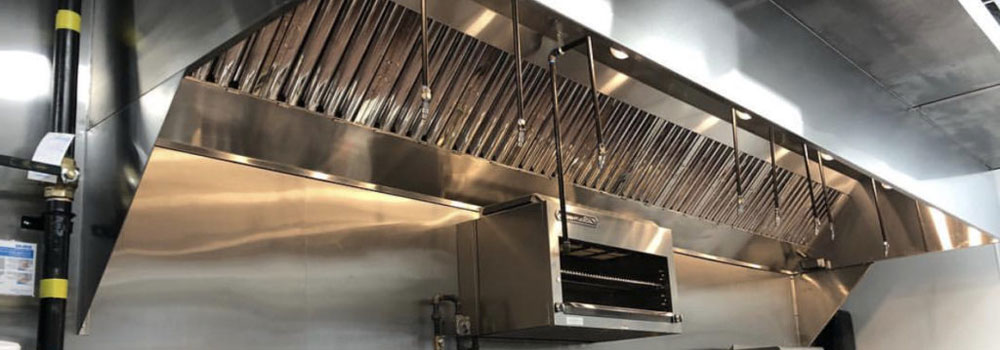There are no excuses for avoiding conditions that may lead to kitchen disasters. Though your home kitchen hood doesn’t require continual and routine deep cleaning, commercial kitchen hoods are hotbeds for potential fire hazards if they are not cleaned properly and routinely. Because grease builds up over time with continual use, commercial kitchens must understand the importance and necessity for restaurant hood cleaning.
Cleaning your restaurant hoods is not only a requirement by the National Fire Protection Association (NFPA) and most health districts, it is a necessity to avoid a build up of grease, deterioration of your equipment, potential fines, and unnecessary accidents. Failure to maintain your equipment properly may lead to fines, but the governing agencies in your area could also potentially shut your kitchen down.
A kitchen exhaust hood hangs over your cooking area in your commercial kitchen and takes in exhaust from fryers and grills to ranges and open fire. Most commercial locations are set up with more than just one hood and each of these will need to be cleaned regularly.
Hoods contain one or more mechanical fans above the equipment to remove airborne heat, smoke, grease and odors. This means that your hood sucks up anything and everything to keep it out of your fire, your food and your kitchen.
The four primary components of the hood are made up of the following: filters, fans, grease traps and ductwork. These are all magnets for grease and debris which must be cleared and cleaned out completely.
Filters
Filters are most often stainless-steel mesh that serves to protect the fans by keeping debris out. Filters become coated with grease and other airborne debris that often can’t be seen with the naked eye.
Fans
These mechanical fans work to pull the smoke, heat and odors up and out of your building. Their suction draws out air impurities.
Trays
Trays that sit on the inside edge of your ductwork collect any grease that drips back down along the ventilation system, called grease traps.
Ductwork
The ductwork is the galvanized steel channel that captures the airflow and guides it through and out of your facility. Ductwork becomes coated with grease and grime throughout your system.
There are many benefits to maintaining cleaning schedules and routinely cleaning the kitchen hoods.
Air Flow
Enhancing the airflow throughout your system will allow your equipment and your staff to be efficient.
Reduce Fire Risk
The risks of fire and grease-related slips and falls are reduced by cleaning your hoods.
Maintain Equipment
Routine maintenance increases the life of your equipment and the internal components of your equipment throughout your kitchen, also saving you money in the long run. Scheduled cleaning will allow your kitchen equipment to run quieter and more efficiently.
Hygiene and Safety
Commercial kitchen hood cleaning sustains a clean, overall appearance but hygiene and safety will increase with efficient and routine cleanings.
Avoid preventable fines and fees from safety agencies in your area by cleaning your kitchen hood routinely. The NFPA, local health districts and even local fire agencies can fine your restaurant or cooking facility or even shut your facility down, either temporarily or even permanently. Not only is this an avoidable loss of money but dealing with local agencies can be tedious and difficult.
Each component needs to be cleaned routinely, depending on the extent of use and capacity of your kitchen equipment.
The NFPA requirement includes a recommended frequency of hood cleaning directly correlated to your establishment volume and use.
Kitchen that use solid fuels, such as wood, coal or charcoal, should routinely clean their hoods monthly. Because solid fuels usually require raw, open heat, it is recommended to clean these the most often. Most dining operations fall under the quarterly recommended schedule. These are establishments that do not use sold fuels and are high volume use. Commercial venues with average or below average usage are recommended for semi-annual restaurant hood cleaning.
Establishments that are low volume or seasonal, such as churches, day camps or special event sites, are recommended to be cleaned annually.
Remember that no matter your commercial kitchen function or volume, routine cleaning is essential maintenance for your restaurant hood that could save not only lives but also money and unnecessary accidents.
Please see the information below to learn more spots in your restaurant you should pay extra cleaning attention to.
Provided by FOG Tank – heated soak tank for sale


Comments are closed.